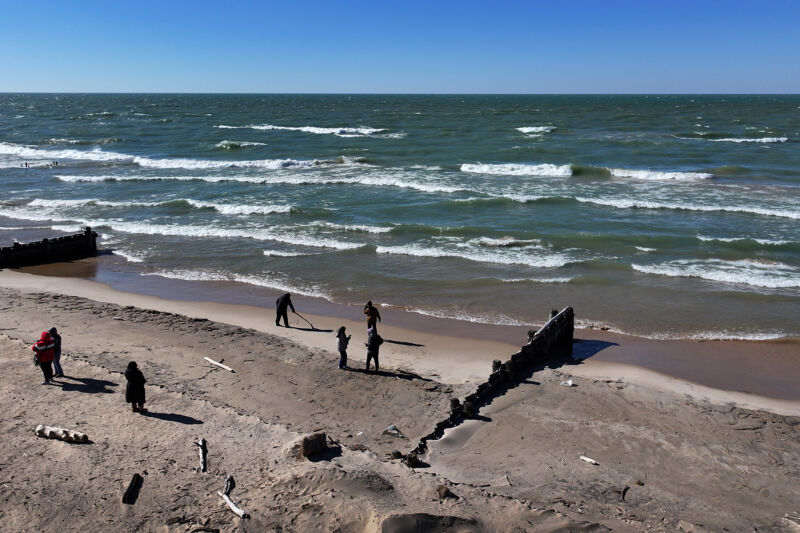The Great Lakes Compact —
As aquifers dry up, some Midwest communities are looking to the region’s natural resources.

Enlarge / Waves roll ashore along Lake Michigan in Whiting, Indiana.
This article originally appeared on Inside Climate News, a nonprofit, independent news organization that covers climate, energy, and the environment. It is republished with permission. Sign up for their newsletter here.
The aquifer from which Joliet, Illinois, sources its drinking water is likely going to run too dry to support the city by 2030—a problem more and more communities are facing as the climate changes and groundwater declines. So Joliet eyed a huge water source 30 miles to the northeast: Lake Michigan.
It’s the second-largest of the Great Lakes, which together provide drinking water to about 10 percent of the US population, according to the National Oceanic and Atmospheric Administration’s Office for Coastal Management.
Soon, Joliet residents will join them. After years of deliberation, their city government decided last year to replace the aquifer by piping it in from Lake Michigan, buying it from the city of Chicago.
Project construction will start in 2025 with the intent to have water flowing to residents by 2030, said Theresa O’Grady, an engineering consultant working with the city of Joliet. Joliet will foot the approximately $1 billion bill for the project, including the cost to build 65 miles of piping that will transport water from Chicago to Joliet and neighboring communities.
Not just anyone can gain access to Lake Michigan’s pristine, saltless water. That’s rooted in the Great Lakes Compact, an agreement that governs how much water each state or Canadian province can withdraw from the lakes each day. With some exceptions, only municipalities located within the 295,200-square-mile basin (which includes the surface area of the lakes themselves) can get approved for a diversion to use Great Lakes drinking water.
Joliet is one of those exceptions.
“I’ve seen occasional news stories about, ‘Is Kansas suddenly going to get Lake Michigan water because Joliet got Lake Michigan water?’ We are going above and beyond to demonstrate how much we respect the privilege we have to use Lake Michigan water. We are spending hundreds of millions of dollars to be good stewards of that,” said Allison Swisher, Joliet’s director of public utilities.
In April 2023, then-Chicago Mayor Lori Lightfoot signed an agreement with Joliet and five other nearby communities to supply them with treated Lake Michigan water. Now, legal experts and other Great Lakes communities are left wondering how Joliet, located well outside of the Great Lakes basin, fits in.
The exemption in the Great Lakes Compact
The Great Lakes Region, which encompasses portions of New York, Pennsylvania, Ohio, Indiana, Illinois, Michigan, Wisconsin, and Minnesota, as well as the Canadian province of Ontario, is governed through the Great Lakes Compact, enacted in 2008.
“If you do not live in a straddling community, or you’re not a city in a straddling county, you don’t have a ticket to the dance. You can’t even ask for a Great Lakes water diversion,” said Peter Annin, director of the Mary Griggs Burke Center for Freshwater Innovation at Northland College and author of The Great Lakes Water Wars.
“With the exception of the state of Illinois,” he added.
The Chicago exemption, as it is often referred to, has roots in the 1800s, when animal waste from the city’s stockyards would flush into the Chicago River, ultimately pouring into Lake Michigan.
“That’s why Chicago embarks on this massive Panama Canal-like water diversion project, to take all that sewage and put it into this long canal, which then would connect with the Des Plaines River southwest of the city, and then the Illinois River, and then the Mississippi River,” Annin said, referring to the infamous reversal of the Chicago River. “Chicago’s solution was to flush its toilet to St. Louis.”
Every day, Chicago had the right to use billions of gallons of Lake Michigan water to divert this water and dilute the pollution downstream. The state of Wisconsin began challenging the diversion in the 1920s, arguing that Illinois’ superfluous water use was depleting water levels in the lake. In 1967, the Supreme Court sided with Illinois, and now, Chicago can do whatever it wants with its 2.1 billion gallons per day.
“So here we are today with this really kind of unbelievable Joliet water diversion proposal,” Annin said.